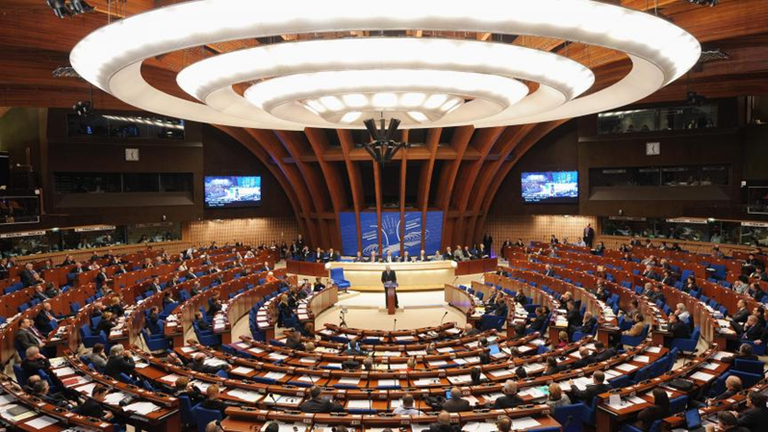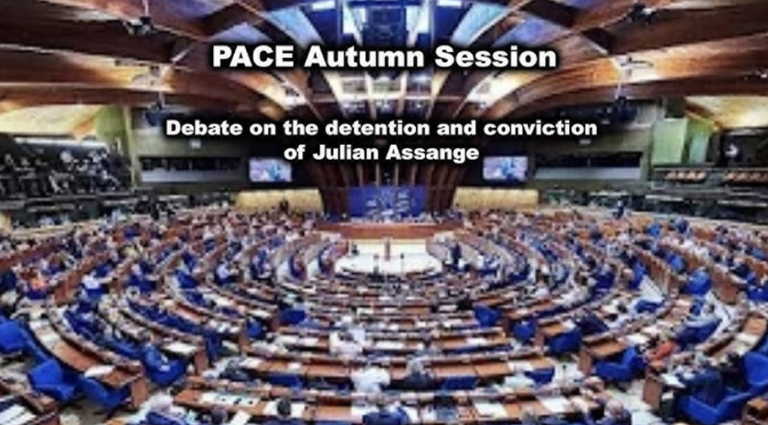By Neenah Payne
Julian Assange’s First Public Appearance Since Release From Prison shows that when the Parliamentary Assembly of the Council of Europe in Strasbourg, France met on October 1, Julian Assange, Australian founder of WikiLeaks, was invited to testify about the attempts by the US to extradite him from London for trial in the US for his publication about its war crimes in the Middle East. If convicted, Assange faced 175 years in prison in the US! How Julian Assange Was Finally Freed explains how Assange was finally able to go home to Australia in June.
Assange addressed the Committee on Legal Affairs and Human Rights, the top human rights community in Europe which represents millions of people in 46 nations. Assange spoke in the context of the Committee’s report on “The detention and conviction of Julian Assange and their chilling effects on human rights.” After Assange gave a 22-minute statement, he fielded questions from PACE members for nearly an hour. Julian Assange's Speech To The Parliamentary Assembly of the Council of Europe includes a transcript of Assange’s remarks. "The rights of journalists and publishers within the European space are seriously threatened. Transnational repression cannot become the norm here," Assange stated.
Assange Implores European Parliamentarians To Oppose US Government's 'Transnational Repression'
It was Assange’s first public remarks about the United States Justice Department’s prosecution since his release from the Belmarsh high-security prison in London.
To avoid extradition to the US, Assange sought political asylum in the Ecuadorian Embassy in London where he lived from on June 19, 2012 until a new administration forced him out. On February 5, 2016, the U.N. Working Group on Arbitrary Detention found that Assange had been unlawfully detained and recommended that he be freed immediately and given compensation. However, British Foreign Secretary Philip Hamond called the finding “frankly ridiculous”.
Although Assange had not been convicted of any crime, on April 11, 2019, police forcibly transferred Assange to the harsh Belmarsh prison where he was held in solitary confinement for 23 hours a day for over five years until his release in June this year.
Timeline of Assange’s 12-Year Ordeal
Julian Assange, WikiLeaks founder, faces US hacking conspiracy charge (video) 4/11/19
The video below explains that on October 2, PACE would debate a report on Assange and vote on whether he had been a “Political Prisoner”.
Julian Assange, WikiLeaks founder, speaks in his first appearance since his release from prison says:
"For their part, the UK authorities failed to effectively protect Assange's freedom of expression and right to liberty, exposing him to lengthy detention in a high-security prison despite the political nature of the most severe charges against him," PACE said. "His detention far exceeded the reasonable length acceptable for extradition."
Assange Implores PACE To Protect Journalists
The video below explains the extreme danger journalists in Europe face of extradition now for political reasons by any country in the world. The last article below says: “The Assembly called on the US, a Council of Europe observer state, to “urgently reform” the 1917 Espionage Act to exclude its application to publishers, journalists and whistleblowers who disclose classified information with the intent to raise public awareness of serious crimes.’
Julian Assange released – but press freedom is still in peril 6/25/24
Assange Implores European Parliamentarians To Oppose US Government's 'Transnational Repression'
It was Assange’s first public remarks about the United States Justice Department’s prosecution since his release from the Belmarsh high-security prison in London. The rights of journalists and publishers within Europe are “seriously threatened” by “transnational repression,” declared WikiLeaks founder Julian Assange. “The criminalization of newsgathering activities is a threat to investigative journalism everywhere.”
Assange further stated, “I was formally convicted by a foreign power for asking for, receiving, and publishing truthful information about that power while I was in Europe. The fundamental issue is simple: Journalists should not be prosecuted for doing their jobs. Journalism is not a crime; it is a pillar of a free and informed society.” He urged the Parliamentary Assembly of the Council of Europe’s (PACE) Committee on Legal Affairs and Human Rights to act now to protect journalists, publishers, and others from the attacks on freedom of expression that have fueled a climate of censorship.
It was Assange’s first public remarks about the United States Justice Department’s prosecution since his release from the Belmarsh high-security prison in London, where he was detained for a little more than five years. The world had not heard him speak in this manner for at least six or seven years, and certainly not as a free man.
Assange was invited to speak to the PACE committee as part of its inquiry into his detention and conviction and the chilling effect that it has had broadly on human rights. The next day the committee planned to vote on whether to designate Assange as a political prisoner.
The WikiLeaks founder defied the justifiable paranoia or reservations that may have discouraged him from leaving his home country of Australia. As Assange said in his statement [full transcript here],
“The gravity of this occasion and the weight of the issues at hand” compelled him to speak to parliamentarians directly.
PACE Debate: Was Julian Assange A Political Prisoner?
Voting Results: On October 2, after speeches by several members, 88 members voted in favor of declaring Julian Assange a political prisoner, 13 voted against, 20 abstained.
Written comments of each speaker: Debate: The detention and conviction of Julian Assange and their chilling effects on human rights
Video: PACE Debate on Julian Assange's Detention & Conviction
PACE Recognizes Julian Assange As A Political Prisoner
PACE recognises Julian Assange as a ‘political prisoner’ and warns against the chilling effect of his harsh treatment 10/2/24
The Parliamentary Assembly of the Council of Europe (PACE) has expressed deep concern at “the disproportionately harsh treatment” faced by Julian Assange and said this has had a “dangerous chilling effect” which undermines the protection of journalists and whistleblowers around the world.
Approving a resolution based on a report by Thórhildur Sunna Ævarsdóttir (Iceland, SOC), the Assembly said Mr Assange’s treatment warranted his designation as a “political prisoner” under a definition it agreed in 2012, citing the severe charges brought against him by the United States of America, exposing him to possible life imprisonment, combined with his conviction under the US Espionage Act “for what was – in essence – newsgathering and publishing”.
The Assembly – which brings together parliamentarians from the 46 nations of the Council of Europe – also called on the US to investigate the alleged war crimes and human rights violations disclosed by him and WikiLeaks. Its failure to do so, combined with the harsh treatment of Mr Assange and Ms Manning, creates a perception that the US government’s purpose in prosecuting Mr Assange was “to hide the wrongdoing of state agents rather than to protect national security”.
The Assembly called on the US, a Council of Europe observer state, to “urgently reform” the 1917 Espionage Act to exclude its application to publishers, journalists and whistleblowers who disclose classified information with the intent to raise public awareness of serious crimes.
For their part, the UK authorities had failed to effectively protect Assange’s freedom of expression and right to liberty, the parliamentarians said, “exposing him to lengthy detention in a high-security prison despite the political nature of the most severe charges against him”. His detention far exceeded the reasonable length acceptable for extradition, they said.
The Assembly was debating Mr Assange’s case after his testimony yesterday to a hearing of its Committee on Legal Affairs and Human Rights, his first public comments since his release from detention in the UK four months ago. Mr Assange, together with his wife Stella, stayed on in Strasbourg after the hearing to watch today’s plenary debate from the public gallery.
Neenah Payne writes for Activist Post
Subscribe to Activist Post for truth, peace, and freedom news. Follow us on Telegram, HIVE, Minds, MeWe, Twitter - X and Gab.
Provide, Protect and Profit from what's coming! Get a free issue of Counter Markets today.


!LUV
@activistpost, @valggav(1/1) sent you LUV. | tools | discord | community | HiveWiki | <>< daily
The wrong people should be punished
#hive #posh
!LUV
@activistpost, @valggav(1/1) sent you LUV. | tools | discord | community | HiveWiki | <>< daily
The issue there is the fact that those council actually corrupted
Free Julian Assange